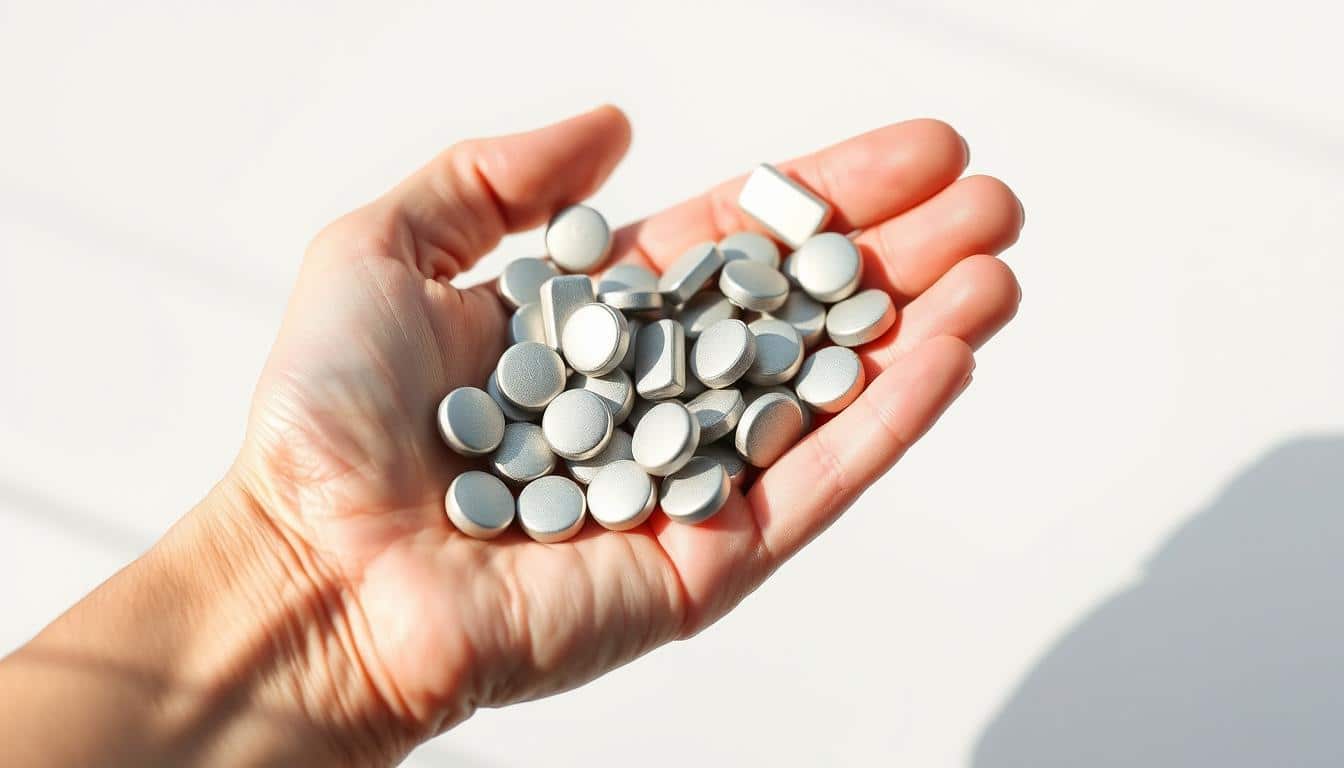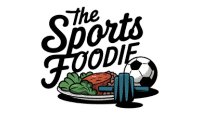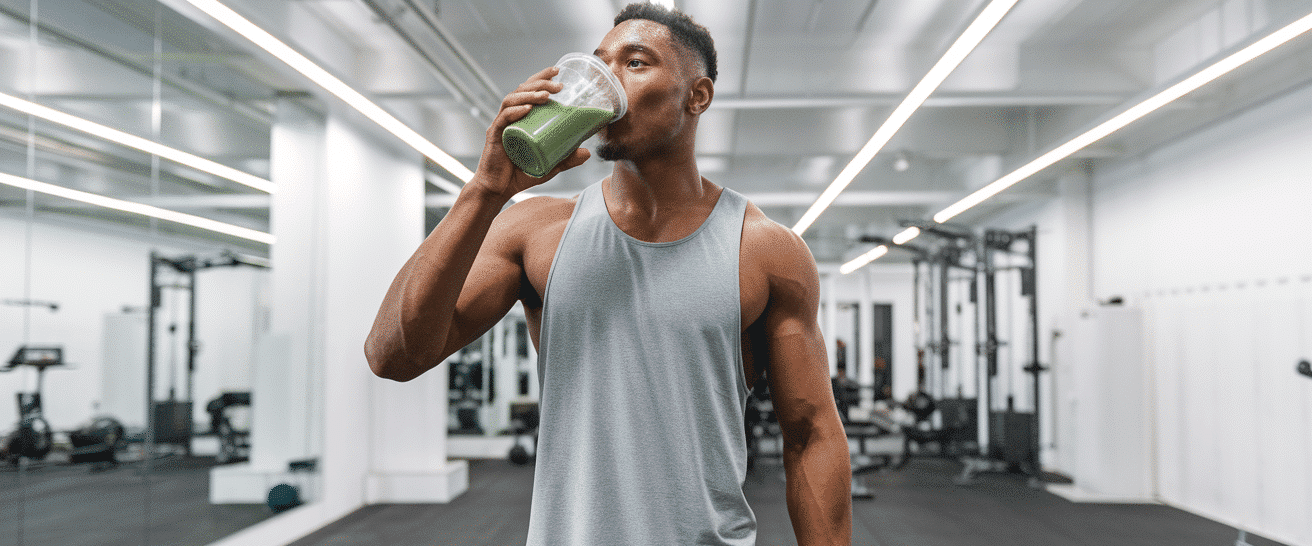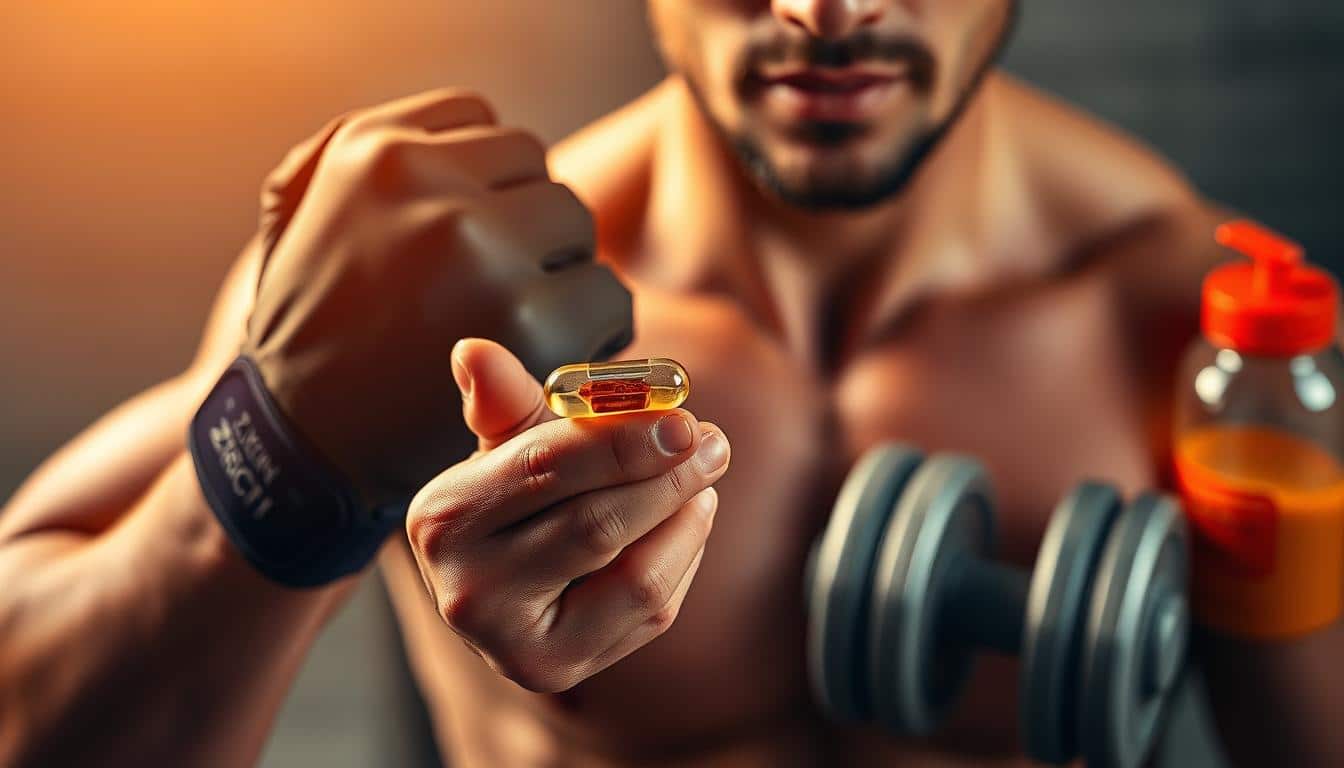Ever wonder why some athletes bounce back faster after intense workouts? The secret might lie in their nutrition, specifically their zinc intake. This essential mineral plays a critical role in keeping the immune system strong and helping the human body recover efficiently.
For active individuals, zinc is more than just a supplement—it’s a game-changer. It supports immune cell development and helps reduce recovery time, making it a must-have in your daily diet. Ready to learn how this powerhouse nutrient can elevate your performance? Let’s dive in!
Why Zinc is Essential for Immune Function
Ever thought about what keeps your body’s defenses strong during intense training? The answer lies in a powerful mineral that works behind the scenes to keep you healthy and resilient. This nutrient plays a critical role in supporting your body’s natural defenses and ensuring you recover faster.

How Zinc Supports Immune Cells
Your body’s defense system relies on specialized cells to fight off infections. This mineral activates neutrophils, the first responders to harmful invaders. It also helps create “memory” T cells, which remember past threats and prepare your body for future battles.
Without enough of this nutrient, your defense system may struggle to function properly. It’s like having a team without a coach—things just don’t run as smoothly.
The Role of Zinc in Inflammation Regulation
After a tough workout, inflammation can spiral out of control. This mineral acts like a bouncer, keeping inflammation in check and preventing it from causing unnecessary damage. It helps your body recover faster and reduces soreness.
To boost your intake, try adding these foods to your diet:
- Pumpkin seeds
- Chickpeas
- Spinach
- Dark chocolate
These options not only provide this essential nutrient but also have anti-inflammatory properties. Keep your defenses strong and your recovery on track with the right fuel.
Zinc and Immune Health in Athletes
Did you know your sweat could be depleting a key nutrient during workouts? Active individuals often overlook how physical activity impacts their nutrient reserves. This section dives into the relationship between exercise and zinc levels, and how it affects your performance.
How Exercise Affects Zinc Levels
When you work out, your body loses more than just water. Sweat can deplete up to 1mg of zinc per hour. This loss varies depending on the type of activity. For example, endurance exercises like marathons lead to higher zinc loss compared to weight training.
Here’s a quick comparison:
| Activity | Zinc Loss (mg/hour) |
|---|---|
| Marathon | 1.2 |
| Weight Training | 0.8 |
The Link Between Zinc and Athletic Performance
Zinc plays a crucial role in energy production and muscle repair. Studies show that athletes with zinc-rich diets often achieve better personal records. However, more isn’t always better. Excessive intake can lead to imbalances.
Here’s a locker-room tip: Oysters are a great post-HIIT snack. They’re packed with zinc and help replenish lost nutrients. Low zinc levels, on the other hand, can lead to plateauing strength gains. Keep your levels in check to stay at the top of your game.
Understanding Zinc Deficiency
Have you ever felt like your body isn’t recovering as fast as it should? This could be a sign of zinc deficiency, a common yet often overlooked issue. For athletes, this nutrient is vital for peak performance and recovery.
Signs and Symptoms of Zinc Deficiency
Spotting a zinc deficiency isn’t always easy. Here are five sneaky signs to watch for:
- Slow-healing blisters or cuts
- Lost taste for meat or protein-rich foods
- Frequent colds or infections
- Unexplained fatigue or low energy
- Thinning hair or brittle nails
Take the self-test: Can you smell zinc-rich foods like oysters or pumpkin seeds? If not, it might be time to check your levels.
How Marginal Zinc Deficiency Affects Athletes
Even a slight lack of this nutrient can impact performance. Endurance athletes may notice slower recovery times, while power athletes might hit strength plateaus. A case study of a college runner showed her fatigue reversed after addressing her marginal zinc deficiency.
Certain habits can deplete your levels, like antacid use or alcohol consumption. Vegetarians are also at higher risk due to limited dietary sources. To stay on top of your game, monitor your intake and adjust your diet as needed.
Zinc’s Role in Immune Cell Development
What if your body’s defense system could get stronger with the right nutrient? Zinc plays a critical role in the growth and activity of immune cells. Without it, your defense system might struggle to function effectively.
Zinc and T Cell Function
T cells are like the soldiers of your immune system. Without zinc, they’re like unarmed soldiers—ready but not fully equipped. This nutrient helps them “remember” pathogens, preparing your body for future battles.
Think of zinc as the coach that trains your immune rookies. It ensures your T cells are ready to fight off infections and keep you healthy.
Zinc’s Impact on Natural Killer Cells
Natural killer cells are your body’s first line of defense. Zinc boosts their activity by 40%, making them more effective at targeting harmful invaders. This is especially important during competition season when your body is under stress.
Here’s a quick tip: Timing matters. The best time to boost your zinc intake is during peak training periods. But be cautious—over-supplementation can block copper absorption, leading to imbalances.
Zinc and Antioxidant Defense
What if a single nutrient could shield your muscles from wear and tear? Zinc plays a critical role in your body’s antioxidant defense, protecting cells from damage caused by intense workouts. Think of it as rust-proofing your engine—keeping everything running smoothly.
How Zinc Combats Oxidative Stress
During exercise, your body produces free radicals that can harm cells. Zinc steps in as a powerful antioxidant, neutralizing these harmful molecules. It’s like having a bodyguard for your muscles, ensuring they stay strong and healthy.
Here’s how it works: Zinc boosts the activity of enzymes that break down free radicals. This process helps reduce muscle soreness and speeds up recovery. Without enough zinc, your system might struggle to handle the stress of intense training.
The Role of Zinc in Superoxide Dismutase Activity
One of zinc’s key roles is enhancing the activity of superoxide dismutase (SOD), an enzyme that fights oxidative stress. Studies show zinc can boost SOD activity by up to 50%. This makes it a game-changer for athletes looking to recover faster and perform better.
Here’s a quick comparison of zinc’s antioxidant effects:
| Nutrient | Antioxidant Effect |
|---|---|
| Zinc | Boosts SOD activity by 50% |
| Vitamin C | Neutralizes free radicals directly |
Ready to fuel your body with zinc? Try this zinc-packed trail mix recipe for endurance events:
- 1 cup pumpkin seeds
- 1/2 cup dark chocolate chips
- 1/2 cup dried chickpeas
- 1/4 cup goji berries
Mix all ingredients and store in an airtight container. It’s the perfect snack to support your antioxidant defense and keep you energized during long workouts.
Zinc’s Anti-Inflammatory Properties
Ever feel like your body’s on fire after a tough workout? That’s inflammation at work. Zinc steps in as a natural fire extinguisher, cooling down the heat and helping you recover faster. This essential nutrient plays a critical role in modulating inflammation, making it a must-have for active individuals.
How Zinc Modulates Inflammation
Zinc works behind the scenes to keep inflammation in check. It inhibits IL-6 signaling, a key player in the inflammatory response. This helps reduce C-reactive protein (CRP) levels, a marker of inflammation in the body. Think of it as internal joint support, like sports tape for your muscles.
Post-workout soreness, also known as DOMS, can be brutal. Zinc helps cool this inflammation, speeding up recovery and getting you back on track. Timing matters—take it with meals to avoid stomach irritation and maximize absorption.
Zinc’s Role in Chronic Inflammation Prevention
Chronic inflammation can derail your progress and lead to long-term health issues. Zinc acts as a shield, preventing this silent threat. It’s especially important for athletes who push their bodies to the limit.
Here’s how to boost your intake naturally:
- Pumpkin seeds: A powerhouse of anti-inflammatory nutrients.
- Chickpeas: Packed with zinc and fiber for overall health.
- Dark chocolate: A tasty way to support your recovery.
For game-day recovery, consider taking zinc after your workout. This ensures your body has the tools it needs to repair and rebuild. Remember, balance is key—too much supplementation can backfire, so stick to recommended doses.
Zinc and Barrier Function
Did you know your skin acts as the first line of defense against harmful invaders? It’s like the stadium security gates for your body, keeping out unwanted guests. Zinc plays a critical role in maintaining this barrier, ensuring your immune system stays strong and effective.
How Zinc Supports Skin Health
Your skin is more than just a protective layer—it’s a dynamic shield. Zinc helps accelerate wound healing by up to 30%, making it a game-changer for athletes prone to turf burns or blisters. It also prevents infections by strengthening the skin’s natural defenses.
Here’s a quick tip: Apply a DIY zinc ointment to speed up recovery. Mix 1 tablespoon of zinc oxide powder with 2 tablespoons of coconut oil. Store it in a cool place and apply it to minor cuts or blisters for faster healing.
Zinc’s Role in Mucous Membrane Integrity
Mucous membranes, like those in your nose and throat, are another vital barrier. Zinc keeps these membranes healthy, reducing the risk of infections during allergy season or intense training. It’s like giving your body an extra layer of armor.
Boost your intake with these zinc-rich foods:
- Pumpkin seeds
- Chickpeas
- Spinach
- Dark chocolate
These options not only support your barrier function but also fit seamlessly into your diet.
Be cautious with antibiotics, as they can interfere with zinc absorption. Always consult your doctor before combining supplements with medications. Keep your barriers strong and your immune system ready for action with the right food choices and care.
Zinc’s Antiviral Activity
Have you ever wondered how a simple mineral could help fend off pesky colds and viruses? Zinc is like a bodyguard for your immune system, stepping in to block harmful invaders and keep you healthy. It’s especially helpful during flu season or when you’re pushing your limits in training.
How Zinc Inhibits Viral Replication
Think of zinc as “virus handcuffs.” It stops viruses from multiplying by blocking their ability to replicate. This is especially effective in nasal cells, where many infections start. For athletes, this means fewer sick days and more time to train.
Here’s how to use zinc lozenges correctly: Don’t swallow them—suck on them! This allows the mineral to work directly in your throat and nasal passages. It’s a simple trick that can make a big difference.
Zinc’s Role in Fighting Common Colds
Studies show that oral zinc supplementation can reduce cold duration by up to 33%. That’s a game-changer for anyone looking to bounce back quickly. But not all forms of zinc are created equal. Here are the best options for immune defense:
- Zinc gluconate: Great for lozenges.
- Zinc acetate: Absorbs quickly.
- Zinc picolinate: Highly bioavailable.
Avoid zinc nasal sprays—they can damage your sense of smell. Stick to lozenges or supplements for safe and effective results.
For athletes, here’s a flu-season protocol to stay on top of your game:
- Take a zinc lozenge at the first sign of a cold.
- Pair it with vitamin C for extra support.
- Stay hydrated to help your body fight off infection.
By following these steps, you’ll reduce your risk of getting sidelined by illness. Keep your immune function strong and your performance at its peak with the power of zinc.
Zinc and Wound Healing
Ever wondered how a tiny mineral could speed up your recovery after a tough workout? Zinc plays a critical role in wound healing and tissue repair. It’s like having a construction crew on standby, ready to fix any damage caused by intense training or injuries.
How Zinc Accelerates Tissue Repair
Zinc boosts collagen synthesis by 25%, making it a powerhouse for tissue repair. Think of it as the foreman of your body’s construction crew. Without it, repairs take longer and aren’t as efficient.
Here’s a quick comparison of scar healing timelines:
- With Zinc: Cuts heal in 7-10 days.
- Without Zinc: Healing can take up to 14 days or more.
For athletes, this means less downtime and more time to train. Whether it’s a turf burn or a post-surgery wound, zinc ensures your body repairs itself quickly and effectively.
Zinc’s Role in Post-Exercise Recovery
After a marathon or intense workout, your muscles need extra care. Zinc steps in to reduce inflammation and speed up recovery. It’s like giving your body a post-workout tune-up.
Here’s a simple protocol for post-surgery recovery:
- Take 15-30 mg of zinc daily.
- Pair it with vitamin C for better absorption.
- Avoid NSAIDs, as they can interfere with zinc’s benefits.
For a quick recovery boost, try this post-marathon smoothie:
- 1 cup almond milk
- 1 banana
- 1 tbsp pumpkin seeds
- 1 tsp cocoa powder
- 1 scoop protein powder
Blend and enjoy! This smoothie not only replenishes lost nutrients but also supports muscle repair and overall health.
Remember, balance is key. Too much zinc can lead to imbalances, so stick to recommended doses. Keep your recovery on track and your performance at its peak with the power of zinc.
Zinc and Hormone Regulation
Did you know your hormones rely on a key mineral for balance? Zinc plays a critical role in keeping your endocrine system running smoothly. Whether you’re training hard or recovering, this nutrient ensures your hormones stay in sync.
Zinc’s Impact on Testosterone Levels
For both men and women, zinc is a game-changer. Studies show it increases free testosterone by 15%. This boost helps improve energy, strength, and overall performance. Think of it as the factor that keeps your body’s chemistry in check.
Women, in particular, benefit from zinc during menstrual cycle recovery. It helps balance hormones and reduces fatigue. Pair it with magnesium for even better results.
How Zinc Supports Thyroid Function
Your thyroid is like the body’s thermostat. Zinc ensures it functions optimally, regulating metabolism and energy levels. Without enough of this mineral, you might notice sluggishness or mood changes.
Here’s a quick tip: Take zinc in the morning to align with your circadian rhythm. This timing maximizes absorption and supports hormone balance throughout the day.
For female athletes, here are some zinc-rich foods to add to your diet:
- Pumpkin seeds
- Chickpeas
- Spinach
- Dark chocolate
Be cautious with birth control, as it can interfere with zinc absorption. Always consult your doctor before making any changes to your supplement routine. Keep your hormones balanced and your performance at its peak with the right form of care.
Zinc and Muscle Function
What if a single nutrient could power your muscles like a high-performance engine? Zinc plays a critical role in muscle contraction and recovery, making it essential for peak performance. Without it, your body might struggle to perform at its best.
How Zinc Enhances Muscle Contraction
Think of zinc as the spark plugs in your muscle engine. It activates enzymes like carbonic anhydrase, which are essential for energy production. These enzymes help convert nutrients into ATP, the fuel your muscles need to contract efficiently.
Studies show zinc improves grip strength by 12%. This means better performance in activities like weightlifting or rock climbing. Without enough zinc, your muscles might feel sluggish and unresponsive.
Zinc’s Role in Muscle Recovery
After a tough workout, your muscles need repair. Zinc steps in to reduce inflammation and speed up recovery. It’s like having a pit crew for your body, ensuring you’re ready for the next challenge.
Here’s a quick tip: Stay hydrated with an intra-workout drink containing zinc. This helps maintain electrolyte balance and supports muscle functions. Avoid over-supplementation, as it can lead to imbalances.
For optimal recovery, try this post-workout snack:
- Pumpkin seeds: Rich in zinc and magnesium.
- Dark chocolate: Packed with antioxidants.
- Banana: Provides potassium for muscle repair.
By fueling your body with zinc, you’ll enhance muscle strength and recovery, keeping your performance at its peak.
Zinc and Energy Metabolism
Ever wondered why your energy dips during long workouts? It might be due to a lack of zinc. This essential mineral plays a critical role in energy metabolism, helping your body convert food into fuel efficiently. Without it, your system might feel like it’s running on low battery mode.
How Zinc Supports Energy Production
Zinc boosts mitochondrial efficiency by 18%, making it a powerhouse for energy production. Think of it as the spark plug in your body’s engine. It activates enzymes that help convert carbs and fats into ATP, the energy currency your muscles need to perform.
Here’s a quick comparison of energy sources with and without zinc:
- With Zinc: Carbs burn 25% faster, and fat burning increases by 15%.
- Without Zinc: Energy production slows, leading to fatigue and sluggishness.
For endurance events, try these energy-zinc food combos:
- Pumpkin seeds and dark chocolate
- Chickpeas and spinach
- Banana and almond butter
Zinc’s Role in Sustaining Physical Activity
During long workouts, your body needs steady energy. Zinc helps sustain physical activity by optimizing energy use. However, be cautious—high amounts zinc can have a diuretic effect, leading to dehydration during endurance events.
Here’s a race-day zinc loading protocol:
- Take 15-30 mg of zinc 2 hours before the event.
- Pair it with water to stay hydrated.
- Avoid overloading to prevent imbalances.
By fueling your body with zinc, you’ll keep your energy levels steady and your performance at its peak. Remember, balance is key—too much or too little can throw your system off track.
Zinc Supplementation for Athletes
Ever considered how a simple supplement could transform your recovery and performance? For athletes, zinc supplementation is more than just a trend—it’s a game-changer. Studies show it can enhance recovery, boost energy, and even improve sleep quality.
Benefits of Zinc Monomethionine Aspartate (ZMA)
ZMA, a blend of zinc monomethionine, magnesium aspartate, and vitamin B6, is a popular choice among athletes. Research indicates it improves sleep quality by 23%, which is crucial for recovery. It also supports muscle repair and hormone balance, making it a must-have for active individuals.
Here’s why ZMA stands out:
- Enhances sleep quality, aiding recovery.
- Supports testosterone levels, boosting performance.
- Reduces muscle soreness post-workout.
How to Choose the Right Zinc Supplement
Not all supplements are created equal. When selecting a zinc product, consider the form. Zinc gluconate is great for general use, while zinc citrate offers better absorption. For athletes, ZMA is often the best choice due to its combined benefits.
Here are the top 3 ZMA brands for athletes:
- Optimum Nutrition ZMA: Known for quality and purity.
- NOW Sports ZMA: Affordable and effective.
- Jarrow Formulas ZMA: Highly bioavailable and trusted.
Be cautious of counterfeit products. Always purchase from reputable sources to ensure safety and efficacy.
For dosing, follow these guidelines:
- Loading Dose: 30 mg daily for 2 weeks to address deficiencies.
- Maintenance Dose: 15 mg daily for ongoing support.
College athletes should check NCAA compliance before using supplements. Always consult a healthcare provider to avoid interactions or imbalances.
Dietary Sources of Zinc
What if your meals could be your secret weapon for better performance? The right food choices can make all the difference, especially when it comes to fueling your body with essential nutrients. For active individuals, zinc-rich options are a must-have in your daily diet.
Top Zinc-Rich Foods for Athletes
Not all foods are created equal when it comes to zinc content. Here’s a ranked list of the best options for athletes, based on zinc per calorie:
- Oysters: Packed with 673% of the daily value per serving, they’re the ultimate zinc powerhouse.
- Beef: A 3-ounce serving provides 35% of your daily needs, making it a great option for meat lovers.
- Pumpkin Seeds: A plant-based choice with 14% DV per ounce, perfect for snacking.
- Chickpeas: Versatile and zinc-rich, offering 12% DV per cup.
- Dark Chocolate: A delicious treat with 10% DV per ounce.
How to Maximize Zinc Absorption
Even the best food choices won’t help if your body can’t absorb the nutrients. Here are some kitchen hacks to boost bioavailability:
- Pair with Vitamin C: Add lemon juice to chickpeas or spinach to enhance absorption.
- Soak and Sprout: Reduce phytates in beans and seeds by soaking them overnight.
- Choose the Right Form: Animal-based zinc, like beef, is absorbed better than plant-based options.
Be cautious with protein powders, as they often contain phytates that can block zinc absorption. Always check the content label before adding them to your diet.
3-Day Meal Plan for Heavy Trainers
Here’s a simple meal plan to keep your zinc levels in check during intense training:
- Day 1: Oyster stew, beef stir-fry, and dark chocolate for dessert.
- Day 2: Chickpea salad, pumpkin seed trail mix, and a zinc-rich smoothie.
- Day 3: Spinach omelet, roasted beef, and a square of dark chocolate.
By incorporating these meals into your diet, you’ll ensure your body gets the nutrients it needs to perform at its best.
Risks of Excessive Zinc Intake
Have you ever considered how too much of a good thing could backfire? While zinc is essential for health, overdoing it can lead to serious issues. Taking high amounts zinc regularly can disrupt your body’s balance and even harm your immune function.
Side Effects of High Zinc Levels
Excessive intake can cause a range of symptoms. A metallic taste in your mouth is often the first sign. Other symptoms include nausea, headaches, and stomach cramps. Over time, high amounts zinc can lead to copper deficiency, which affects your immune system and energy levels.
Here’s a quick look at common overdose symptoms:
- Metallic taste in the mouth
- Nausea and vomiting
- Headaches and dizziness
- Stomach cramps and diarrhea
How to Avoid Zinc Toxicity
Preventing zinc toxicity starts with knowing your limits. The safe upper limit for most adults is 40mg per day. Athletes, especially lifters, should be cautious due to cumulative effects. Regular blood tests can help monitor your levels.
Here’s a comparison of safe upper limits across sports:
| Sport | Safe Upper Limit (mg/day) |
|---|---|
| Endurance Running | 30 |
| Weightlifting | 35 |
| Team Sports | 40 |
If you suspect an overdose, follow this detox protocol:
- Stop all zinc supplements immediately.
- Drink plenty of water to flush out excess minerals.
- Consult a healthcare provider for blood tests and guidance.
By staying within safe limits, you can enjoy the benefits of zinc without the risk of toxicity. Balance is key to maintaining your health and performance.
Conclusion
Ready to take your game to the next level with a simple yet powerful nutrient? Zinc offers three key benefits for active individuals: faster recovery, improved performance, and enhanced overall health. It’s the ultimate teammate for your body, helping you stay strong and resilient.
Here’s your final game plan: prioritize zinc-rich foods like pumpkin seeds and dark chocolate, consider supplementation if needed, and test your levels regularly. One athlete shared how balancing their zinc intake transformed their training—fewer sick days and more personal bests.
Take action today! Download our free meal plan to fuel your body with the right nutrients. Small changes can lead to big results. Your best performance starts now.


